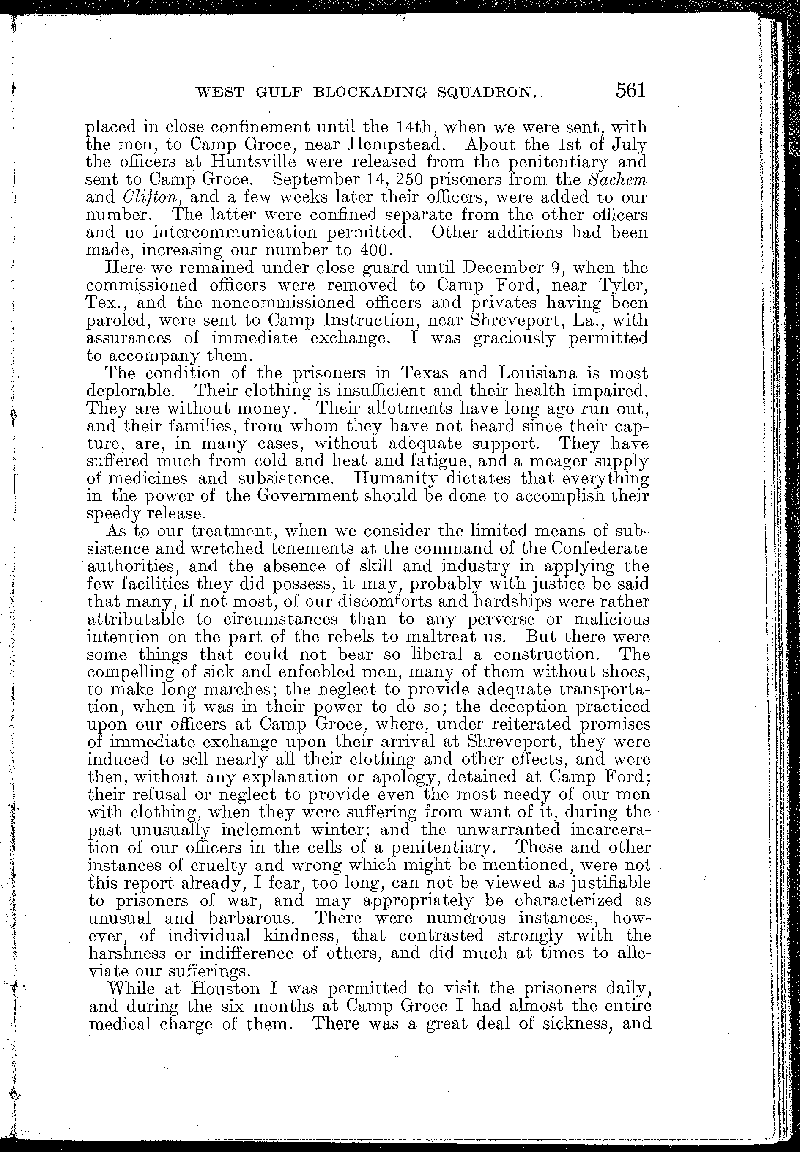
Report, dated April 12, 1864, by John W. Sherfy, U. S. Navy, Surgeon of the U. S. Morning Light when it was captured by Confederate "Cotton-Clad" steamers, to Gideon Welles, Secretary of the Navy (Page 4 of 5). This report is in Volume 19 of the Official Records of the Union and Confederate Navies in the War of the Rebellion.

(This report is continued from page 560) placed in close confinement until the 14th, when we were sent, with the men, to Camp Grace, near Hempstead. About the 1st of July the officers at Huntsville were released from the penitentiary and sent to Camp Groce. September 14, 250 prisoners from the Sachem and Clifton, and a few weeks later, their officers, were added to our number. The latter were confined separate from the other officers and no intercommunication permitted. Other additions had been made, increasing our number to 400.
Here we remained under close guard until December 9, when the commissioned officers were removed to Camp Ford, near Tyler, Tex., and the noncommissioned officers and privates having been paroled, were sent to Camp Instruction, near Shreveport, La., with assurances of immediate exchange. I was graciously permitted to accompany them.
The condition of the prisoners in Texas and Louisiana is most deplorable. Their clothing is insufficient and their health impaired. They are without money. Their allotments have long ago run out, and their families, from whom they have not heard since their capture, are, in many cases, without adequate support. They have suffered much from cold and heat and fatigue, and a meager supply of medicines and subsistence. Humanity dictates that everything in the power of the Government should be done to accomplish their speedy release.
As to our treatment, when we consider the limited means of subsistence and wretched tenements at the command of the Confederate authorities, the absence of skill and industry in applying the few facilities they did possess, it may, probably with justice said that many, if not most, of our discomforts and hardships were rather attributable to circumstances rather than to any perverse or malicious intention on the part of the rebels to maltreat us. But there were some things that could not bear so liberal a construction. The compelling of the sick and enfeebled men, many of them without shoes, to make long marches; the neglect to provide adequate transportation, when it was in their power to do so; the deception practiced upon our officers at Camp Groce, where, under reiterated promises of immediate exchange upon their arrival at Shreveport, they were induced to sell nearly all their clothing and other effects, and were then, without any explanation or appology, detained at Camp Ford; their refusal or neglect to provide even the most needy of our men with clothing, when they were suffering from want of it, during the past usually inclement winter, and the unwarranted incarceration of our officers in the cells of a penitentiary. These and other instances of cruelty and wrong which might be mentioned, were not this report already, I fear, too long, can not be viewed as justifiable to prisoners of war, and may appropriately be characterized as unusual and barbarous. There were numerous instances, however, of individual kindness, that contrasted strongly with the harshness or indifference of others, and did much at times to alleviate our sufferings.
While at Houston I was permitted to visit the prisoners daily, and during the six months at Camp Groce I had almost the entire medical charge of them. There was a great deal of sickness, and (this report is continued on page 562)
This site is sponsored by the Friends of the Old Naval Hospital
Last updated November 9, 2008